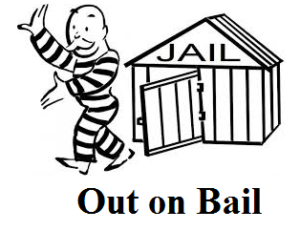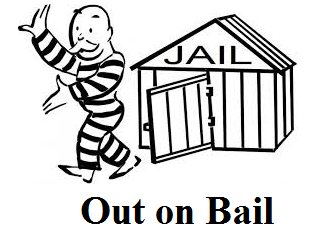
- The meaning of “bail” is to set an accused person free after depositing some money with the court before he is tried, often on condition that a sum of money would be forfeited if he does not attend the trial. a warrant for the defendant’s arrest is issued.
- The judge sets the amount, and the money is deposited with the clerk of the court. It is returned after the case is finished. Thus bail is the security given to the court to assure it that the accused person will return to the court on the day of trial. Bail may be posted as “cash,” or through a bond.
- A bond is a legal contract that requires someone to pay money if a defendant fails to return to court. It is guaranteed by the assets of the person who posted it, such as real estate, savings, or valuable personal property.
- A personal bond without sureties means that the person is released on his personal undertaking that he would regularly attend the court and in case of default would forfeit to the government a sum of money.
- If a personal bond requires one or more sureties, then it would mean that a third person (surety) is made responsible for the obligations of the accused and he would be made to pay the bail amount on the breach of the bail conditions by the accused. Such a bond is called a surety bond. In such a situation the court in its discretion asks the person acting as surety to keep collaterals worth the amount of the bail bond as a security with the court.
Types of Bail Bonds:
Own Recognizance:
- Own recognizance release is a no-cost bail where a defendant signs a form stating they promise to appear in court as required, instead of making a payment. This type of bail is usually available for minor offences.
- Factors such as a suspect’s past record, ties to the community, support of family members, social status, and employment are taken into account by a judge when offering own recognizance release.
- Even though no money is paid with this type of bail, all other aspects of a defendant’s release remain the same.
Cash Bond:
- Bail can be paid in cash. Payment by credit cards or cheque drawn from personal or business accounts are not accepted.
- The judge sets the amount, and the money is deposited with the clerk of the court. It is returned after the case is finished.
Property Bond:
- A property bond is a bond that posts the value of tangible property, such as real estate, in order to obtain a pre-trial release from jail. Most jurisdictions require a warranty deed, a current tax statement showing the property’s fair market value and that all taxes are current, a current mortgage statement showing that all payments are current, and if there is more than one owner, an agreement signed by each owner indicating that the property may be used to finance a bond.
- If the defendant fails to appear in court, the property can be put into the auction and after the auction proceeding, the court will collect the bail amount that is owed.
- If the sale of the property does not cover the amount of the bail, the court can seek to recover the difference from the accused.
Provisions for Bail in Criminal Procedure Code:
- When a matter of bail applications comes, it is only the Magistrate or Sessions Court or High Court in which power is imposed to grant it. Bail laws in India are described under Section 437, 438, 439 of Code of Criminal Procedure, 1973.
- Section 437 of Code of Criminal Procedure, 1973 contemplates that any person arrested or detained in a non-bail able offence, the Court other than Sessions Court may grant him bail.
- Section 438 of Code of Criminal Procedure, 1973 contemplates that the Session Court or the High Court may grant anticipatory bail to a person apprehending arrest.
- Section 439 of the Code of Criminal Procedure, 1973 contemplates that the Sessions Court or the High Court can grant bail to a person who has been arrested.
Types of Offences:
- Before taking the decision about to grant bail or not, the court has to categorize the offence in either bailable or non-bailable category. For categorization Schedule of the Criminal Procedure Code is used as a reference.
Bailable Offence:
- Bailable offences are of minor nature. In the case of bailable offence, the Magistrate has no discretion and he has to grant the bail.
- In such cases, bail is a right and the arrested person must be released after depositing the bail with the court. As soon as all the requirements of the set bail have been met. Police cannot refuse to release a person from custody if he/she fulfils all the necessities.
-
Once bail is granted to a person, it does not mean that the person is free. The individual is still a suspect and must appear at court for the trial.
Non-Bailable Offence:
- Non-bailable offences are of a severe nature. In the case of non-bailable offence, the court may release the accused on bail only subject to the conditions laid down in S. 437 of the Criminal Procedure Code.
-
The factors that influence the decision of not granting the bail are the seriousness of the offence, the chances that the accused will interfere with the investigation by tampering with evidence or threatening witnesses or if the accused is likely to go into hiding or leave the country to escape, the court will decide whether he/she can be allowed to be let out on bail or not. If someone is refused bail, he/she can appeal to a higher court.
-
If the police do not complete their investigation within 60 days for a crime that is not punishable with death or life imprisonment, then the accused gets bail. For offences that are punishable with death or life imprisonment, the investigation must be concluded within 90 days, or the accused will have the right to bail.
Procedure for Obtaining Bail:
- When a person is arrested they are first taken to the police station which exercises jurisdiction over the area where the accused resides to book the case.
- Information is recorded by the Police Officer regarding the name, residence address, birth-place, charges filed against the accused etc. He will check the criminal background of the accused, fingerprints and files a case against the accused.
- The accused has to submit Form 45 given in the second schedule to the court in which his case is being heard. In case, the accused has committed a non-bailable offence, he can submit a similar form before the Court in which his case is being heard, but it has been left to the discretion of the Court to decide the same.
Discretion of Court in Granting or Refusing Bail:
- In the case of bailable offence, the Magistrate has no discretion and he has to grant the bail.
- The amount the accused may have to deposit with the court will be at the discretion and decision of the judge. For certain smaller crime cases, a standard amount is set by convention and practice which needs to be deposited for awarding the bail.
- The granting of bail is usually considered to be an inherent right. However, there are certain circumstances where bail may be refused – these are related to Non-Bailable Offences.
- In non-bailable offences accused may be granted bail if the Court deems it fit. The relevant circumstances should be presented to show to the Court that bail would not harm the further process of trial and justice and the accused would not interfere with the investigation by tampering with evidence or threatening witnesses or would not go into hiding or leave the country.
Anticipatory Bail:
- Anticipatory bail is meant to be a safeguard for a person who has false accusation or charges made against him/her, most commonly due to professional or personal enmity, as it ensures the release of the falsely accused person even before he/she is arrested.
- Under Section 438 of the Criminal Procedure Code, there is a provision for a person to seek ‘Anticipatory Bail’. This means that an individual can seek or request to get bail in anticipation or in expectation of being named or accused of having committed a non-bailable offence.
-
If the court, based on a number of conditions and the nature of the case, sees merit in the petition the anticipatory bail is granted. Hence if and when the person is arrested, he/she will be immediately released on the basis of the anticipatory bail.
-
The court issuing anticipatory bail issue the same under some conditions, they are as follows.
- The person will make him/herself available for interrogation by the police as and when required by them.
- The person shall not leave India without prior permission from the court
- The individual shall not directly or indirectly make any threat, promise or offer any bribe to any person who is connected to the case or knows facts about the case, so as to keep them quiet or to get them to change their report of facts to the court or the police
- The person shall not interfere with the investigation proceedings.
- Such other conditions as may be imposed by the court in the facts and circumstances of the case.
- After such bail is granted, if sufficient facts are later shown, the Court may cancel the anticipatory bail.
